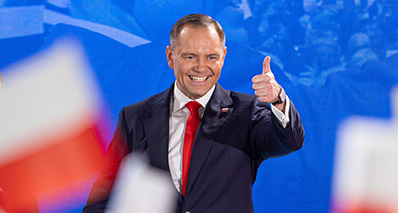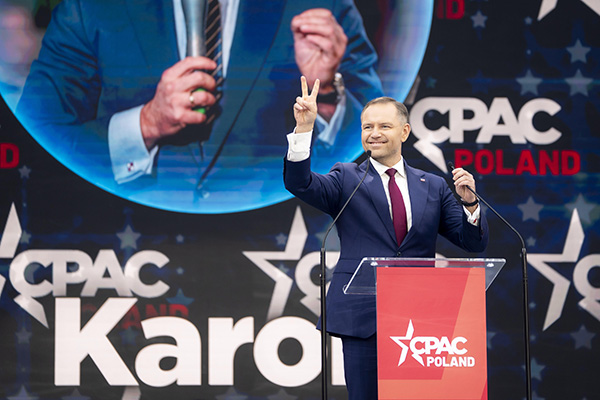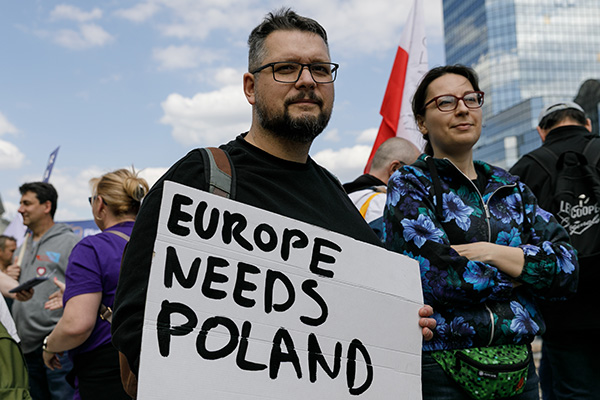The Rise of the Polish Right
Gregory Hood, American Renaissance, June 6, 2025

Credit Image: © Antoni Byszewski/Newspix via ZUMA Press
Journalists and politicians have repeatedly declared that populism and nationalism are fading. There have been setbacks, but the overall trend is positive. Nationalism is clearly on the rise in Europe, even though patriots face a race against time as demographics change.
Romania recently crushed a right-wing challenge through tactics that most would call brutally authoritarian if used by the Right. The Romanian government banned Călin Georgescu as a candidate after he won the first round of elections, claiming that Russia had somehow engineered his victory.
In the follow-up election, Bucharest mayor Nicusor Dan defeated conservative replacement George Simion in what one source called a blueprint for the Continent: “The message to Europe is clear: Russian influence can be resisted, and centrist, democratic forces can prevail.” New Eastern Europe argued that Mr. Dan successfully portrayed himself as an outsider who nonetheless advocated mainstream policies, thus thwarting the populists. This is similar to what Emmanuel Macron did in France, where a man with no established party saved the establishment from Marine Le Pen’s National Rally.
Some in Romania argue that the election was stolen. The defeated Mr. Simion called the election a “coup” and his AUR party boycotted the inauguration. Romania’s Constitutional Court rejected a challenge that alleged vote buying and fraud. Mr. Simion had argued that France and Moldova interfered in the election, that dead people had voted, and that Telegram’s CEO was prepared to testify that he was told to suppress conservative voices. The court was not interested, and Mr. Dan called the case fraudulent. The banned Mr. Georgescu has retired from politics, saying that the “sovereigntist movement has come to a close.” Still, AUR leads in voter preferences according to a recent poll, though it probably could not win an outright majority. Populism in Romania was defeated, at least for now.
What just happened in Poland may be more important. With Germany deindustrializing and the French economy stagnant, Poland is becoming Europe’s economic and military powerhouse. It is the sixth largest contributor to the EU, one of the fastest growing economies in Europe, and is rapidly expanding its armed forces. Any effort to deter so-called Russian expansionism will rely on Poland.
Poland also was, until recently, the center of the “New Europe” that was setting a more conservative direction against left-wing dictates from Brussels. Prime Minister Donald Tusk has tried to reverse this. He criticized the previous administration of the conservative Law and Justice Party and pledged integration with Brussels. In response, the European Commission has been notably friendly towards Warsaw.
However, though Prime Minister Tusk took control of the government, the Law and Justice Party kept the presidency, and could therefore frustrate Mr. Tusk’s reforms. CNN claims Law and Justice “led an eight-year assault on the independence of the country’s judicial system, media, and cultural bodies,” and hoped Mr. Tusk could offer a “blueprint for scrubbing a country free of populism.” That depended on the presidential elections that pitted liberal Warsaw mayor Rafal Trzaskowski against historian Karol Nawrocki, who was backed by Law and Justice. This was like what happened in Romania: The liberal mayor of the capital city was the establishment’s choice to see off the danger from the so-called far right.
In a move that would have been called blatant foreign intervention just a few years ago, Department of Homeland Security Secretary Kristi Noem endorsed Mr. Nawrocki. “I just had the opportunity to meet with Karol and listen: he needs to be the next president of Poland,” she said. The White House also hosted Mr. Nawrocki, and a photo of him with the President was prominent in the campaign. “Europe today is in a great crisis,” Mr. Nawrocki said at the recent CPAC in Poland.

Karol Nawrocki speaks at the Conservative Political Action Conference (CPAC) in Jasionka, Poland, May 27, 2025. (Credit Image: © Dhsgov/Dhs/Planet Pix via ZUMA Press Wire)
One of the main reasons the conservative candidate was able to fend off accusations of “foreign influence” — which is code for Russian meddling — was his role as head of the Institute of National Remembrance. He led efforts to discredit the idea that the Red Army “liberated” Poland at the end of the Second World War. After his election, the Russian Interior Ministry reportedly put the new president on a “wanted list” because of he ordered Soviet monuments destroyed. It is hard to call such a figure a Russian stooge — though he does oppose Ukrainian membership in NATO.
The international press has reported the Polish election as a major defeat for the European Union, presaging a deadlock with Donald Tusk in Warsaw. While the president has little power to implement policy, he can derail the prime minister’s projects. “The European Union has looked to Tusk for a blueprint on undoing the effects of populism on a democracy,” said CNN, “but a victory for Nawrocki was not part of the plan.” The prime minister is defiant: “We do not intend to take a single step back.”
There is much for white advocates to celebrate in Mr. Nawrocki. He is pushing for closer ties with more conservative Central and Eastern European states rather than with France and Germany. He also wants more reparations from Germany, which, paradoxically, could help a German Right, which is inclined to reject such demands. His victory is also a political boost to President Donald Trump in his dealings with the EU on trade. Most importantly, he said he would reject the EU’s “Migration Pact,” which would commit Europe to a shared responsibility for migrants and asylum seekers. “My Poland is a Poland without illegal migrants,” he says.
He also said:
In our heritage lies the heart of who we are. We are open and ready to cooperate with people of different backgrounds. However, we expect anyone stepping into our home to respect our values and identity. That is why I cannot support what is happening with the EU’s migration policy — especially when Germany’s past mistakes could compromise the safety of Polish women and children.
“Our tradition and culture are not obstacles to modernity,” he said. “They are the foundation upon which we will build a strong, prosperous nation.” No patriot could disagree.
But the press can. Bemoaning the progressive failure in “arguably Europe’s most consequential election of the year,” the Carnegie Endowment said that “given his ideological proximity to MAGA-style conservatism, he will be an obstacle for the government on migration and rule of law issues.”
The New York Times called the election an “ominous signal,” adding:
Mr. Nawrocki’s victory signals both a missed opportunity and the possibility of a new political reality. With little to lose, the new president is likely to more energetically oppose the government. He may refuse to sign the 2026 budget, for example, a move that under certain conditions would set the stage for early elections. Populists are betting on that scenario, and if parliamentary elections are held in early 2026, current polling suggests that Law and Justice and the far-right Confederation party could form a coalition.
Internationally, the trans-Atlantic populist alliance is tightening. It is hard to maintain an understanding of MAGA as straightforwardly isolationist unless one ignores the informal meetings, shared tactics, and ideological feedback loops between populism on both sides of the ocean, as well as MAGA’s energetic interventions in European elections — unsuccessful in Germany and in Romania, and now successful in Poland. And these interventions will probably increase now that Mr. Nawrocki has demonstrated that people Mr. Trump endorses in photos can win in Europe.
“Nationalism can still be a winning platform, depending on local conditions,” said Bloomberg. “Regardless of the current stock price of nationalism, the trend line over the past several decades is up.” Bloomberg concluded that protectionism or gridlock tends to hurt a country economically, but it was the right-wing governments of Poland that gave it its prosperity, in comparison to the malaise gripping France and Germany.
We cannot assume nationalism will always rise in Europe. While the Right — rural, Catholic voters and those who favor traditional values — united behind Mr. Nawrocki, the progressives split. Some pro-choicers reportedly stayed home to punish Donald Tusk for not doing enough to expand abortion.
There are three lessons here. First, conservatives must unite. Mr. Tusk’s broad, fragile coalition government had few tangible accomplishments it could point to during its term, and that allowed a populist challenge to exploit anti-incumbency feelings. Voters overlooked media attacks on Mr. Nawrocki because they saw a fighter for their causes, and that overcame his relative youth and inexperience. Second, the combination of young men and rural voters can trump urban elites, as it can in America. The Right must keep this voting base.

A supporter shows support for Polish presidential candidate Rafal Trzaskowski. In the first round of Poland’s presidential election, Warsaw Mayor Rafal Trzaskowski received 31.52% of the vote, while Karol Nawrocki garnered 29.53%. (Credit Image: © Volha Shukaila/SOPA Images via ZUMA Press Wire)
Finally, impeccable nationalist credentials prevent candidates from being smeared as tools of Russia. Hypocritical as it seems, pro-immigration parties have used the charge of “Russian interference” to discredit nationalists around the world. Such a charge does not work against someone the Russian government has put on a wanted list.
Mr. Nawrocki’s remarkable campaign is proof that nationalists can still win, even in hostile circumstances, even in the most critical battleground of Eastern Europe. Brussels is on notice that a new generation is determined to Make Europe Great Again.















